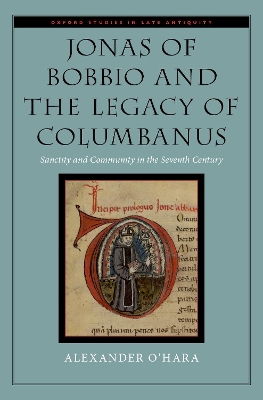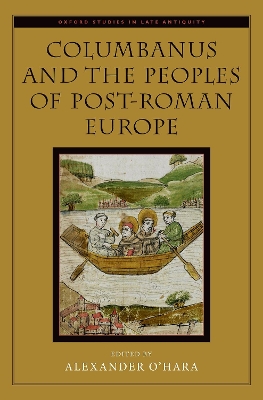Oxford Studies in Late Antiquity
2 total works
Jonas of Bobbio, writing in the mid seventh century, was not only a major Latin monastic author, but also an historical figure in his own right. Born in the ancient Roman town of Susa in the foothills of the Italian Alps, he became a monk of Bobbio, the monastery founded by the Irish exile Columbanus, soon after his death in 615. He became the archivist and personal assistant to successive Bobbio abbots, travelled to Rome to obtain the first papal privilege of
immunity, and served as a missionary priest on the northern borderlands of the Frankish kingdom. He spent the rest of his life in Merovingian Gaul as abbot of the double monastic community of Marchiennes-Hamage, where he wrote his Life of Columbanus, one of the most influential works of early medieval
hagiography.
This book, the first major study devoted to Jonas of Bobbio, his corpus of three saints' Lives, and the Columbanian familia, explores the development of the Columbanian monastic network and its relationship to its founder. The Life of Columbanus was written following a period of crisis within the Columbanian familia and it was in response to this crisis that the Bobbio community in Lombard Italy commissioned Jonas to write the work. Alexander O'Hara presents the
Life of Columbanus as a subtle and clever critique of the changes and crises that had taken place in the monastic communities since Columbanus's death. It also considers the life of Jonas as reflecting many of the changing political, cultural, and religious circumstances of the seventh century, and his writings as instrumental in
shaping new concepts of sanctity and community. The result of the study is a unique perspective on the early medieval Age of Saints and the monastic and political worlds of Merovingian Gaul and Lombard Italy in the seventh century.
immunity, and served as a missionary priest on the northern borderlands of the Frankish kingdom. He spent the rest of his life in Merovingian Gaul as abbot of the double monastic community of Marchiennes-Hamage, where he wrote his Life of Columbanus, one of the most influential works of early medieval
hagiography.
This book, the first major study devoted to Jonas of Bobbio, his corpus of three saints' Lives, and the Columbanian familia, explores the development of the Columbanian monastic network and its relationship to its founder. The Life of Columbanus was written following a period of crisis within the Columbanian familia and it was in response to this crisis that the Bobbio community in Lombard Italy commissioned Jonas to write the work. Alexander O'Hara presents the
Life of Columbanus as a subtle and clever critique of the changes and crises that had taken place in the monastic communities since Columbanus's death. It also considers the life of Jonas as reflecting many of the changing political, cultural, and religious circumstances of the seventh century, and his writings as instrumental in
shaping new concepts of sanctity and community. The result of the study is a unique perspective on the early medieval Age of Saints and the monastic and political worlds of Merovingian Gaul and Lombard Italy in the seventh century.
The period 550 to 750 was one in which monastic culture became more firmly entrenched in Western Europe. The role of monasteries and their relationship to the social world around them was transformed during this period as monastic institutions became more integrated in social and political power networks. This collected volume of essays focuses on one of the central figures in this process, the Irish ascetic exile and monastic founder, Columbanus (c. 550-615), his
travels on the Continent, and the monastic network he and his Frankish disciples established in Merovingian Gaul and Lombard Italy.
The post-Roman kingdoms through which Columbanus travelled and established his monastic foundations were made up of many different communities of peoples. As an outsider and immigrant, how did Columbanus and his communities interact with these peoples? How did they negotiate differences and what emerged from these encounters? How societies interact with outsiders can reveal the inner workings and social norms of that culture. This volume aims to explore further the strands of this vibrant
contact and to consider all of the geographical spheres in which Columbanus and his monastic communities operated (Ireland, Merovingian Gaul, Alamannia, Lombard Italy) and the varieties of communities he and his successors came in contact with - whether they be royal, ecclesiastic, aristocratic, or
grass-roots.
travels on the Continent, and the monastic network he and his Frankish disciples established in Merovingian Gaul and Lombard Italy.
The post-Roman kingdoms through which Columbanus travelled and established his monastic foundations were made up of many different communities of peoples. As an outsider and immigrant, how did Columbanus and his communities interact with these peoples? How did they negotiate differences and what emerged from these encounters? How societies interact with outsiders can reveal the inner workings and social norms of that culture. This volume aims to explore further the strands of this vibrant
contact and to consider all of the geographical spheres in which Columbanus and his monastic communities operated (Ireland, Merovingian Gaul, Alamannia, Lombard Italy) and the varieties of communities he and his successors came in contact with - whether they be royal, ecclesiastic, aristocratic, or
grass-roots.

